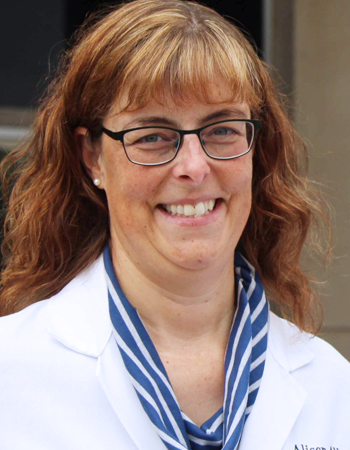Feature: Collaborating for teaching and research success
By Cam Buchan
A “human first” approach to leadership.
That is what enables the Department of Anatomy and Cell Biology to succeed under the leadership of Alison Allan, PhD.
 As Chair, Allan ensures the Department delivers the highest quality education and research programs in a collaborative work environment. “My job is to set everyone up for success, so we can deliver on all of the elements of the new strategy,” she said.
As Chair, Allan ensures the Department delivers the highest quality education and research programs in a collaborative work environment. “My job is to set everyone up for success, so we can deliver on all of the elements of the new strategy,” she said.
With a young faculty, many with families, Allan’s “human-first” approach to leadership has paid off.
“Letting them know I have their back and will work collaboratively with them to solve problems has resulted in optimal outcomes in less-than-optimal circumstances.”
The priority her team places on education, innovation and research has also contributed to their success.
As a result, Allan’s department has stayed engaged while achieving the highest standards of work. Teams are developing new areas of research using cadaveric anatomy to enhance surgical education and skills. In cell biology, faculty are translating bench research into the clinic and investigating diseases based in cell biology, such as cancer. The Department is also building partnerships with industries to translate knowledge into actionable information for the community. For example, researchers working in the area of cannabis addiction are involved with outreach programs for the community around high-risk populations most vulnerable to dependence.
Allan has also benefited from close relationships among the other leaders in the Basic Science departments within Schulich Medicine & Dentistry, allowing them to be strong advocates for their teams. The group’s collaborative approach enabled them to quickly restart and continue their research programs in the face of the pandemic.
Learning leadership
Appointed in February 2018, Allan continues to hold a joint appointment in the Departments of Anatomy and Cell Biology and Oncology. Her joint appointment means she profited from the mentorship of Dr. Glenn Bauman and Kem Rogers, PhD, former Chairs of Oncology and Anatomy and Cell Biology, respectively.
“Both of them had very different styles and challenges, which provided a very rich mentorship model for me,” she said.
Allan’s own research focuses on cellular and molecular mechanisms of cancer metastasis and how that knowledge can be used to benefit patients.
“Surgeons and radiation oncologists are getting really good at treating or even curing cancer when it just stays in the primary site, but when the cancer spreads, it’s more difficult to find and treat. It’s actually the cause of about 90 per cent of all cancer deaths. That’s why we focus on that particular aspect of cancer.”
Looking ahead
As the Department moves forward, Allan will continue to apply the lessons learned during the pandemic, such as innovative teaching methods developed in the anatomy lab. On the research side, there will be more opportunities to collaborate online with researchers across the country and worldwide.
Allan and family – husband Ben Hedley, PhD, who was appointed to Pathology and Laboratory Medicine as a hematology scientist in 2019, and son Tom, 12 – are looking forward to spring and a long-anticipated ski trip to Big White in British Columbia. In the meantime, the family is making good use of streaming services and indulging in movie-buffs Ben and Tom’s love of the Marvel Cinematic Universe.
As Allan looks ahead, a key priority will be the department’s approach to Equity, Diversity, and Inclusion (EDI), a pillar of the School’s strategic plan. Allan is involving all members in the development of an EDI strategy that guides the Department.
“Our underlying principle is that we do this in a meaningful way,” she said. “We want to be purposeful about making sure that all of the initiatives we put in place are things that we care deeply about.”
Allan will also continue building strong relationships between research and teaching in the department, and to develop a new generation of leaders.
“Succession planning should always be part of a leader’s job. Creating a strong cohort of up-and-coming leaders who will take the Department, the School and the broader community to the next level is very important.”









